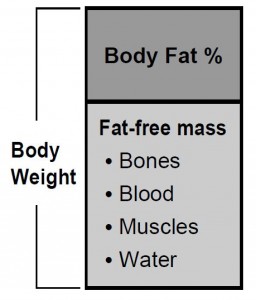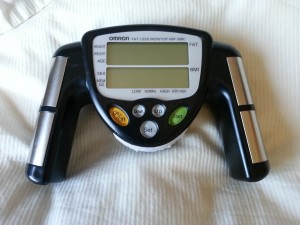It is the final week in April and we will look at body composition. This InBody article – Body Composition 101: The Beginner’s Guide – is great. (Understand, InBody sells body composition measurement tools.)
So, rather than cover all the details here, I’ll hit the highlights and you can read the article for more in-depth information. So, in the simplest body composition model, the body is divided into two components – fat mass and fat-free mass. The fat-free mass includes everything that is not fat – organs, bones, muscle, water, etc. There are tools that can measure your fat mass or body fat %.
What tools you ask?
- Skinfold calipers – Used to measure your body fat at several body areas. The number of points measured can impact your end result. Also, this can be prone to user error.
- Hydrostatic weight – A measurement is taken while you are on a special scale submerged in water. This is considered one of the best measurement methods.
- DEXA – These x-ray machines have been used to measure bone density. Apparently, they are now being used to measure body composition as well.
- Bioelectric Impedance Analysis (BIA) – These devices send an electrical current through your body to obtain a measurement. You can purchase a scale, there are hand-held devices, and there are higher-end full-body BIA devices.
What I want to share with you are the results from my measurements over the past several days. I used the Omron Fat Loss Monitor as that is what I use with clients. This is a hand-held monitor that sends a 50 kHz current through your body.
I purposely took my measurements under “different conditions” to see what my results would look like.
| Day | Time | Measurement | Scenario |
|---|---|---|---|
| Tue, 4/19 | 7:30 am | 21.5% | After 80 minute hot yoga; Didn't hydrate after class; No food |
| Wed, 4/20 | 8:10 am | 24.1% | After 30 minute walk; Proper hydration; No food |
| Thu, 4/21 | 8:00 am | 22.6% | After 80 minute hot yoga; Proper hydration; No food |
| Sat, 4/23 | 7:30 am | 21.6% | No exercise; Proper hydration; No food |
| Sun, 4/24 | 9:00 am | 22.8% | No exercise; Proper hydration; After breakfast |
Now, surely my body composition didn’t really change by almost 3% from one day to the next. Ideally, you should take your measurement under similar conditions each time. This means about the same time of day, in the same environment, and with similar hydration. You should not take a measurement shortly after eating a meal.
I did this because I was curious to see if my measurements would change under different scenarios. What this points out is this…while obtaining information from a device like this is useful, it is not something to lose sleep over. Just as our weight may vary day-to-day, our body measurements may do the same because we can’t have the same exact condition every single time we take a measurement. Every day is different.
If you haven’t taken the Poll yet, take 10 seconds now to vote. I’ll do a wrap-up after the Poll is taken down about the various measurements we have covered this month.


